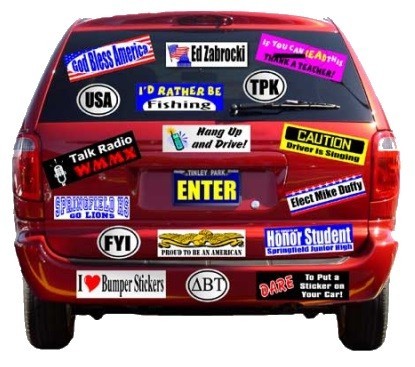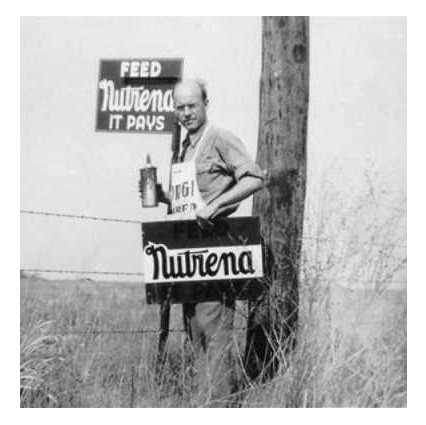The Colorful History of American Bumper Stickers
 Bumper stickers all have a message; whether it's to advertise, advocate, make a witty comment, or even a person’s political position. At S And D Auto Body, we see bumper stickers all around Monrovia and whenever the new slate of candidates start campaigning here in CA we see a lot of those too. So, here are some interesting facts about the history of bumper stickers and how they've amused us over the decades.
Bumper stickers all have a message; whether it's to advertise, advocate, make a witty comment, or even a person’s political position. At S And D Auto Body, we see bumper stickers all around Monrovia and whenever the new slate of candidates start campaigning here in CA we see a lot of those too. So, here are some interesting facts about the history of bumper stickers and how they've amused us over the decades.
Prior to bumper stickers, advertisers used other methods of displaying their wares. In the old days of horse-drawn carriages, advertisers printed the names of their businesses on horsefly nets. In the 1930s and 1940s, bumper signs were stamped on metal and wired to the chrome bumpers.
Developments in material manufacturing during World War II led to the popular use of daylight fluorescent inks, which were created by Bob Switzer and his brother, Joe. These inks appeared to glow during the day and were useful to support various wartime activities; they were favored by early bumper sticker manufacturers after the war.
In addition, the first commercially produced pressure-sensitive stickers appeared after World War II. These new innovations in adhesive materials led to the manufacture of  paper strips with adhesive on the back. Around the same time, vinyl became affordable for widespread consumer use, so pretty soon it also appeared in bumper stickers.
paper strips with adhesive on the back. Around the same time, vinyl became affordable for widespread consumer use, so pretty soon it also appeared in bumper stickers.
Many experts credit Forest P. Gill, a silkscreen printer from Kansas City, Kansas, USA, as the developer of the bumper sticker. Gill recognized that the self-adhesive paper used during World War II could be used to advertise promotional products in the late 1940s and beyond.
Early well-known uses of advertising bumper sticker were primarily for tourist attractions, including Marine Gardens in Florida; Seven Falls in Colorado; Meramec Caverns in Missouri and Lookout Mountain in Tennessee.
Another popular advertisement was the famous "See Rock City" bumper sticker. In the 1940s and 1950s, visitors to this attraction had a sticker applied to their car, which duplicated the famous signs painted on the roofs of barns throughout the Southeast. While tourists visited the attraction, staff people would circulate through the parking lot and putting their bumper stickers on every vehicle.
The first presidential election that utilized adhesive bumper stickers in political campaigns was the 1952 election between Dwight D. Eisenhower and Adlai Stevenson II. After that, every candidate for any office anywhere in the United States has invested in bumper stickers!
So, the next time you're caught in traffic, here in Monrovia or anywhere else and you see a funny or compelling bumper sticker, give a little nod to Forest P. Gill, its inventor. Because until he came around, bumpers and fenders were not as they are today!
Sources: Wikipedia, U.S. Car History News and Forbes













 Bumper stickers all have a message; whether it's to advertise, advocate, make a witty comment, or even a person’s political position. At S And D Auto Body, we see bumper stickers all around Monrovia and whenever the new slate of candidates start campaigning here in CA we see a lot of those too. So, here are some interesting facts about the history of bumper stickers and how they've amused us over the decades.
Bumper stickers all have a message; whether it's to advertise, advocate, make a witty comment, or even a person’s political position. At S And D Auto Body, we see bumper stickers all around Monrovia and whenever the new slate of candidates start campaigning here in CA we see a lot of those too. So, here are some interesting facts about the history of bumper stickers and how they've amused us over the decades. paper strips with adhesive on the back. Around the same time, vinyl became affordable for widespread consumer use, so pretty soon it also appeared in bumper stickers.
paper strips with adhesive on the back. Around the same time, vinyl became affordable for widespread consumer use, so pretty soon it also appeared in bumper stickers.
Social